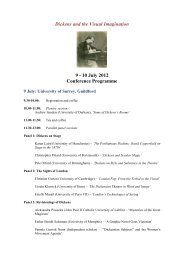The targeted killing of terrorists on foreign soil - Institute of Advanced ...
The targeted killing of terrorists on foreign soil - Institute of Advanced ...
The targeted killing of terrorists on foreign soil - Institute of Advanced ...
Create successful ePaper yourself
Turn your PDF publications into a flip-book with our unique Google optimized e-Paper software.
Tobias Ruettersh<str<strong>on</strong>g>of</str<strong>on</strong>g>f<br />
Panel 4 (a)<br />
November 4th, 2002, the issue came into the centre <str<strong>on</strong>g>of</str<strong>on</strong>g> public attenti<strong>on</strong>. Furthermore, the<br />
United States are not the <strong>on</strong>ly country engaged in the <str<strong>on</strong>g>killing</str<strong>on</strong>g> <str<strong>on</strong>g>of</str<strong>on</strong>g> (suspected) <str<strong>on</strong>g>terrorists</str<strong>on</strong>g>, as<br />
Israel has pursued this policy since the incepti<strong>on</strong> <str<strong>on</strong>g>of</str<strong>on</strong>g> the Sec<strong>on</strong>d Intifada in September 2000<br />
(see David 2002, 1). <str<strong>on</strong>g>The</str<strong>on</strong>g> policy <str<strong>on</strong>g>of</str<strong>on</strong>g> <str<strong>on</strong>g>targeted</str<strong>on</strong>g> <str<strong>on</strong>g>killing</str<strong>on</strong>g> raises numerous legal and political<br />
c<strong>on</strong>cerns. <str<strong>on</strong>g>The</str<strong>on</strong>g> emergence <str<strong>on</strong>g>of</str<strong>on</strong>g> n<strong>on</strong>-state actors in recent years challenge these foundati<strong>on</strong>s, as<br />
there are no clear legal norms. In additi<strong>on</strong>, the <str<strong>on</strong>g>killing</str<strong>on</strong>g> <str<strong>on</strong>g>of</str<strong>on</strong>g> an individual without due process<br />
challenges the rule <str<strong>on</strong>g>of</str<strong>on</strong>g> law in general. I want to take a look at the practice <str<strong>on</strong>g>of</str<strong>on</strong>g> <str<strong>on</strong>g>targeted</str<strong>on</strong>g> <str<strong>on</strong>g>killing</str<strong>on</strong>g><br />
in counter-terrorism campaigns and assess their legality and legitimacy as well as their<br />
effectiveness.<br />
First, the legality <str<strong>on</strong>g>of</str<strong>on</strong>g> <str<strong>on</strong>g>targeted</str<strong>on</strong>g> <str<strong>on</strong>g>killing</str<strong>on</strong>g> under internati<strong>on</strong>al law is assessed. Foremost, it is<br />
discussed whether <str<strong>on</strong>g>targeted</str<strong>on</strong>g> <str<strong>on</strong>g>killing</str<strong>on</strong>g>s have to be c<strong>on</strong>sidered under a war paradigm or a lawenforcement<br />
paradigm. This is particularly important, because in wartime and under<br />
internati<strong>on</strong>al law, the peacetime legal c<strong>on</strong>straints <strong>on</strong> the use <str<strong>on</strong>g>of</str<strong>on</strong>g> deadly force against enemies<br />
are abrogated. To put it another way, under a law-enforcement paradigm a <str<strong>on</strong>g>killing</str<strong>on</strong>g> by a<br />
government <str<strong>on</strong>g>of</str<strong>on</strong>g>ficial would <strong>on</strong>ly be lawful if undertaken in self-defence or defence <str<strong>on</strong>g>of</str<strong>on</strong>g> others,<br />
which is surely incompatible with the noti<strong>on</strong> <str<strong>on</strong>g>of</str<strong>on</strong>g> <str<strong>on</strong>g>targeted</str<strong>on</strong>g> <str<strong>on</strong>g>killing</str<strong>on</strong>g> (see Banks/Raven-Hansen<br />
2003, 671). Hereafter, the jus ad bellum <str<strong>on</strong>g>of</str<strong>on</strong>g> <str<strong>on</strong>g>targeted</str<strong>on</strong>g> <str<strong>on</strong>g>killing</str<strong>on</strong>g> is assessed. Terrorists and<br />
terrorist organisati<strong>on</strong>s such as Al-Qaeda are private, n<strong>on</strong>-state actors but they necessarily<br />
operate from a state’s territory 3 . Thus the fight against <str<strong>on</strong>g>terrorists</str<strong>on</strong>g> <strong>on</strong> <strong>foreign</strong> <strong>soil</strong> always<br />
interferes with the sovereign rights <str<strong>on</strong>g>of</str<strong>on</strong>g> this territorial state. In this sense, the ban <strong>on</strong><br />
interventi<strong>on</strong> and the prohibiti<strong>on</strong> <str<strong>on</strong>g>of</str<strong>on</strong>g> the use <str<strong>on</strong>g>of</str<strong>on</strong>g> force as set forth in Article 2 (4) <str<strong>on</strong>g>of</str<strong>on</strong>g> the Charter<br />
<str<strong>on</strong>g>of</str<strong>on</strong>g> the United Nati<strong>on</strong>s (UN) is discussed and whether there is a possibility to justify interstate<br />
counter-terrorism and <str<strong>on</strong>g>targeted</str<strong>on</strong>g> <str<strong>on</strong>g>killing</str<strong>on</strong>g> as pre-emptive self-defence. However, the possible<br />
justificati<strong>on</strong> <str<strong>on</strong>g>of</str<strong>on</strong>g> self-defence <strong>on</strong> an interstate level does not determine whether this acti<strong>on</strong> is<br />
legal under Internati<strong>on</strong>al Humanitarian Law (IHL). As the Internati<strong>on</strong>al Court <str<strong>on</strong>g>of</str<strong>on</strong>g> Justice<br />
(ICJ) stated in its advisory opini<strong>on</strong> <strong>on</strong> the use <str<strong>on</strong>g>of</str<strong>on</strong>g> nuclear weap<strong>on</strong>s: “A use <str<strong>on</strong>g>of</str<strong>on</strong>g> force that is<br />
proporti<strong>on</strong>ate under the law <str<strong>on</strong>g>of</str<strong>on</strong>g> self-defence, must, in order to be lawful, also meet the<br />
requirements <str<strong>on</strong>g>of</str<strong>on</strong>g> the law applicable in armed c<strong>on</strong>flict which comprise in particular the<br />
principles and rules <str<strong>on</strong>g>of</str<strong>on</strong>g> humanitarian law” (ICJ 1996, 245). As a first step <str<strong>on</strong>g>of</str<strong>on</strong>g> these jus in bello<br />
criteria <str<strong>on</strong>g>of</str<strong>on</strong>g> <str<strong>on</strong>g>targeted</str<strong>on</strong>g> <str<strong>on</strong>g>killing</str<strong>on</strong>g>, it has thus to be determined whether <str<strong>on</strong>g>targeted</str<strong>on</strong>g> <str<strong>on</strong>g>killing</str<strong>on</strong>g> <str<strong>on</strong>g>of</str<strong>on</strong>g> <str<strong>on</strong>g>terrorists</str<strong>on</strong>g><br />
can be c<strong>on</strong>sidered as an armed c<strong>on</strong>flict and if it c<strong>on</strong>stitutes an internati<strong>on</strong>al armed c<strong>on</strong>flict or<br />
a n<strong>on</strong>-internati<strong>on</strong>al armed c<strong>on</strong>flict. If this applicability <str<strong>on</strong>g>of</str<strong>on</strong>g> IHL is affirmed, the questi<strong>on</strong> arises<br />
which legal c<strong>on</strong>sequences this has for <str<strong>on</strong>g>targeted</str<strong>on</strong>g> <str<strong>on</strong>g>terrorists</str<strong>on</strong>g> or insurgents and which restricti<strong>on</strong>s<br />
apply for the lethal use <str<strong>on</strong>g>of</str<strong>on</strong>g> force against those suspected individuals.<br />
3 If <strong>on</strong>e leaves out the less likely opti<strong>on</strong> <str<strong>on</strong>g>of</str<strong>on</strong>g> terrorism <strong>on</strong> the high sea or in space (see Cassese 2005a, 476 ff).<br />
- 2 -
















